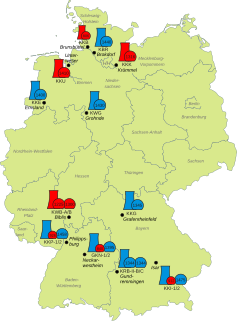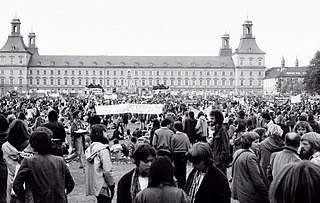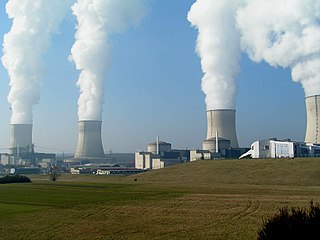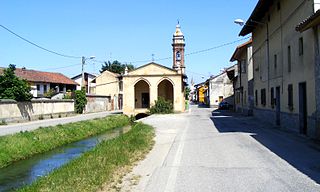The Agenzia nazionale per le nuove tecnologie, l'energia e lo sviluppo economico sostenibile (ENEA) is an Italian Government-sponsored research and development agency. The agency undertakes research in areas which will help to develop and enhance Italian competitiveness and employment, while protecting the environment.
Eurex Exchange is an international exchange which primarily offers trading in European based derivatives. It is the largest European futures and options market. The products traded on this exchange vary from German and Swiss debt instruments to European stocks and various stock indexes. All transactions executed on Eurex Exchange are cleared through Eurex Clearing, which functions as a central counterparty (CCP) for multi-asset class clearing of the above-mentioned exchange-traded product range as well as over-the-counter traded products.

A nuclear power phase-out is the discontinuation of usage of nuclear power for energy production. Often initiated because of concerns about nuclear power, phase-outs usually include shutting down nuclear power plants and looking towards fossil fuels and renewable energy. Three nuclear accidents have influenced the discontinuation of nuclear power: the 1979 Three Mile Island partial nuclear meltdown in the United States, the 1986 Chernobyl disaster in the USSR, and the 2011 Fukushima nuclear disaster in Japan.

The anti-nuclear movement is a social movement that opposes various nuclear technologies. Some direct action groups, environmental movements, and professional organisations have identified themselves with the movement at the local, national, or international level. Major anti-nuclear groups include Campaign for Nuclear Disarmament, Friends of the Earth, Greenpeace, International Physicians for the Prevention of Nuclear War, Peace Action and the Nuclear Information and Resource Service. The initial objective of the movement was nuclear disarmament, though since the late 1960s opposition has included the use of nuclear power. Many anti-nuclear groups oppose both nuclear power and nuclear weapons. The formation of green parties in the 1970s and 1980s was often a direct result of anti-nuclear politics.

Pierrelatte is a commune in the Drôme department in southeastern France. Since the 1980s it hosts one of the biggest production plants of the enriched uranium existing in the world, used both for civil and military purposes.
The Black Fox Nuclear Power Plant was a nuclear power plant proposed by the Public Service Company of Oklahoma (PSO) in May 1973. It was cancelled in 1982.

Nuclear power plants currently operate in 32 countries. Most are in Europe, North America, East Asia and South Asia. The United States is the largest producer of nuclear power, while France has the largest share of electricity generated by nuclear power. Due to an existing policy based on energy security, France obtains about 70% of its electricity from nuclear energy. A newly implemented policy mandates that the country will shift to receive 50% of its electricity from nuclear by 2035. In 2010, before the Fukushima Daiichi nuclear disaster, it was reported that an average of about 10 nuclear reactors were expected to become operational per year, although according to the World Nuclear Association, of the 17 civilian reactors planned to become operational between 2007 and 2009, only five actually came on stream. Global nuclear electricity generation in 2012 was at its lowest level since 1999.

Robassomero is a comune (municipality) in the Metropolitan City of Turin in the Italian region Piedmont, located about 20 kilometres (12 mi) northwest of Turin. As of 1-1-2017, it had a population of 3,093 and an area of 8.58 square kilometres (3.31 sq mi).

Lamporo is a comune (municipality) in the Province of Vercelli in the Italian region Piedmont, located about 35 kilometres (22 mi) northeast of Turin and about 25 kilometres (16 mi) southwest of Vercelli. As of 31 December 2004, it had a population of 515 and an area of 9.8 square kilometres (3.8 sq mi).

Saluggia is a comune (municipality) in the Province of Vercelli in the Italian region Piedmont, located about 30 kilometres (19 mi) northeast of Turin and about 35 kilometres (22 mi) southwest of Vercelli, near the Dora Baltea river.
Five nationwide popular referendums were held in Italy on 8 November 1987, with three questions about nuclear energy after the Chernobyl disaster, and two questions about justice. Voting day had been postponed of six months, according to the Italian Constitution, because of the snap election of spring.

Nuclear power in Italy is a controversial topic. Italy started to produce nuclear energy in the early 1960s, but all plants were closed by 1990 following the Italian nuclear power referendum. As of 2018, Italy is one of only two countries, along with Lithuania, that completely phased out nuclear power for electricity generation after having operational reactors.
A property derivative is a financial derivative whose value is derived from the value of an underlying real estate asset. In practice, because individual real estate assets fall victim to market inefficiencies and are hard to accurately price, property derivative contracts are typically written based on a real estate property index. In turn, the real estate property index attempts to aggregate real estate market information to provide a more accurate representation of underlying real estate asset performance. Trading or taking positions in property derivatives is also known as synthetic real estate.
Nuclear power in the European Union accounted for approximately 26% of total energy production in 2019 and nearly half of low-carbon energy production across EU.

The borlotti bean is a variety of common bean first bred in Colombia as the cargamanto. It is also known as the cranberry bean, Roman bean, romano bean, saluggia bean, gadhra bean orrosecoco bean. The bean is a medium to large tan or hazelnut-colored bean splashed or streaked with red, magenta or black.
National nuclear energy policy is a national policy concerning some or all aspects of nuclear energy, such as mining for nuclear fuel, extraction and processing of nuclear fuel from the ore, generating electricity by nuclear power, enriching and storing spent nuclear fuel and nuclear fuel reprocessing. Nuclear energy policies often include the regulation of energy use and standards relating to the nuclear fuel cycle.

Domenico Farini was an Italian soldier and statesman, who was President of the Italian Senate from 1887 to 1898. He was the son of politician Luigi Carlo Farini.
In finance, a dividend future is an exchange-traded derivative contract that allows investors to take positions on future dividend payments. Dividend futures can be on a single company, a basket of companies, or on an Equity index. They settle on the amount of dividend paid by the company, the basket of companies, or the index during the period of the contract.

DiaSorin is an Italian multinational biotechnology company that produces and markets in vitro diagnostics reagent kits used in immunodiagnostics and molecular diagnostics. The group was founded in 2000 and is headquartered in Saluggia, Italy. Its production is at several plants located in Europe and the United States: Saluggia and Gerenzano (Italy), Dietzenbach (Germany), Stillwater, Minnesota (US), Dartford (UK). The company is a constituent of the FTSE Italia Mid Cap index.

SOGIN is an Italian state-owned enterprise responsible for nuclear decommissioning as well as management and disposal of radioactive waste produced by industrial, research and medical processes. Founded in 1999 following the 1987 Italian referendums on nuclear power, SOGIN was originally part of state owned ENEL but became independent, but still government owned, in 2000. The company initially took over the Caorso, Enrico Fermi, Garigliano and Latina nuclear power plants, later adding other sites including ENEA's EUREX. The company has commenced the decommissioning of all the plants and is predicted to complete the work in 2036. The company has been involved in environmental remediation, radioactive waste management and nuclear safety work in Armenia, Bulgaria, China, Czech Republic, France, Kazakhstan, Lithuania, Romania, Russia, Slovakia and the Ukraine. SOGIN also undertakes other decontamination work and in 2005 started to help to decommission nuclear submarines of the Russian Navy.









